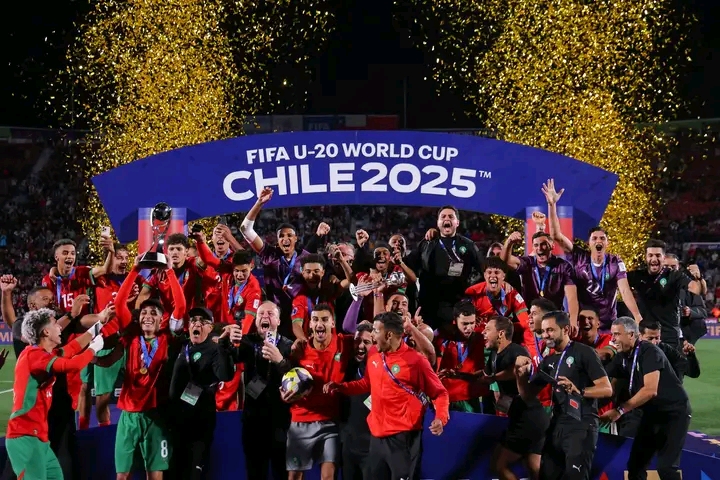For the first time in the nation’s football history, Morocco has been crowned FIFA U-20 World Cup champions, capping an extraordinary campaign that has elevated African football to new heights. The young Atlas Lions triumphed on the world stage, defeating Argentina in a nerve-wracking final that ended in scenes of elation both on the pitch and across the streets of Morocco. It is a victory that will be remembered not just as a footballing achievement but as a testament to vision, structure, and belief.
This historic moment marks Morocco’s first-ever global football title at any level, a feat that has ignited national pride and confirmed the country’s place among the sport’s elite. For years, Morocco’s football system has been lauded for its meticulous planning and investment in youth development. The Mohammed VI Football Academy, established in 2009, has produced a wave of young talents who now carry the flag of a nation that has been steadily rewriting the narrative of African football dominance.
The U-20 side’s journey to the world title was anything but easy. Drawn in a competitive group that included France, Brazil, and South Korea, Morocco had to battle through adversity from the outset. Under the guidance of head coach Hicham Aboushoufa, the young squad showed tactical maturity well beyond their years. Their discipline, composure, and adaptability became the hallmarks of their campaign. After narrowly edging out Brazil in the group stages, Morocco gained global attention — not just for their defensive solidity but also for their fluid attacking transitions and technical quality.

In the knockout rounds, the Atlas Cubs’ character shone through. The quarter-final clash against Nigeria was a true test of grit, ending in a hard-fought 2-1 win that showcased both their physical resilience and tactical intelligence. In the semi-finals against France, Morocco’s determination reached another level. The French side, known for their technical prowess and attacking flair, were held to a 1-1 draw in regulation time. It all came down to penalties, where substitute goalkeeper Abdelhakim El Mesbahi became an overnight hero after saving France’s decisive spot-kick to send Morocco into the final for the first time.
When they faced Argentina, a traditional powerhouse with a record of success in youth tournaments, few expected Morocco to stand toe-to-toe with the South American giants. Yet, from the first whistle, the North Africans matched their opponents in every department. Youssef Anwar’s first-half strike put Morocco ahead, but Argentina equalised midway through the second half, setting up a tense finale. In extra time, neither side could find the winner, and the match once again went to penalties.
The shootout was a test of nerves, courage, and preparation. Each Moroccan player who stepped up did so with calm conviction, converting confidently while the Argentine goalkeeper was left rooted to his line. When captain Othmane Bouftini buried the final penalty, the stadium erupted in an explosion of Moroccan jubilation. Players fell to their knees, tears streaming down their faces as coaches and substitutes stormed the field to join in the celebration.
Across Morocco, from Casablanca to Marrakech, Tangier to Rabat, fans poured into the streets waving flags, beating drums, and singing national songs deep into the night. It was a celebration not just of victory, but of belief; belief in a nation that has proven once again that Africa can rise to the top of the world stage through discipline, structure, and unyielding ambition.

The Moroccan government, led by King Mohammed VI, extended heartfelt congratulations to the team, describing the victory as “a moment of national pride and an inspiration for the youth of Africa.” The Royal Moroccan Football Federation (FRMF), under the leadership of Fouzi Lekjaa, was equally lauded for its role in transforming the country’s footballing landscape. Over the past decade, Morocco has invested heavily in modern training facilities, coach education, and player welfare, efforts that are now paying off across all levels of the game.
This U-20 triumph follows Morocco’s impressive semi-final finish at the 2022 FIFA World Cup, where the senior team made history as the first African nation to reach the final four. It also continues a string of successes across different age groups and competitions, including the women’s national team’s qualification for the World Cup and the men’s clubs’ dominance in CAF competitions.
Analysts have noted that Morocco’s football philosophy has matured significantly over the years. The nation has seamlessly blended technical skill with tactical awareness, creating players who are both physically and mentally equipped to compete at the highest level. This balance, they argue, is what sets Morocco apart and has turned it into Africa’s football blueprint for success.
For the young players, this victory could mark the beginning of illustrious careers. Talents like Youssef Anwar, Othmane Bouftini, and goalkeeper El Mesbahi are already attracting interest from top European clubs. Their success also reflects the growing strength of Morocco’s domestic league and development programs, which continue to nurture young players with global ambitions.
Beyond the trophy, this moment carries deeper meaning. It signifies Africa’s growing competitiveness in global football and challenges the long-held notion that world titles are beyond the continent’s reach. For Morocco, it also represents the fruits of consistent vision, one that prioritises long-term growth over short-term gains.
As the Atlas Lions lifted the golden trophy into the Chilean night sky, the message was clear: Morocco’s time has come. The nation has transitioned from dreamers to doers, from hopeful contenders to global champions. It’s a story of perseverance, unity, and purpose, one that transcends football and speaks to the heart of every African nation striving to rise.
The celebrations may last for days, but the legacy of this victory will endure for generations. Morocco’s U-20 World Cup win is not just a sporting achievement; it is a cultural and continental statement — proof that Africa’s youth, when given the right platform and belief, can conquer the world.
Morocco defeat France on penalties to reach U-20 World Cup final

